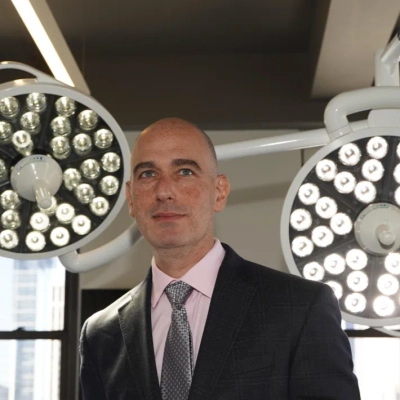Career Advice for Job Seekers
How can an employee turn a part-time, seasonal job into a full-time, permanent healthcare career?
Healthcare professionals reveal practical strategies for converting seasonal positions into lasting careers through dedication and strategic growth. Leading industry experts share proven techniques for demonstrating value beyond temporary roles while building essential skills that organizations need year-round. By mastering these career advancement approaches, part-time healthcare workers can position themselves as indispensable team members worthy of permanent status.
- Become the Patient Experience Problem-Solver
- Transform Seasonal Work Into Career Audition
- Cross-Train to Fill Multiple Healthcare Roles
- Fix Problems Others Ignore
- Solve a Team Problem and Track Results
- Take Initiative Beyond Basic Job Requirements
- Approach Every Shift as Career Opportunity
- Treat Part-Time Work as Already Permanent
- Expand Your Assignment Scope Strategically
- Express Career Goals to Employers Early
- Invest in Certifications While Working Part-Time
- Show Job Satisfaction and Reliability
- Pursue Professional Healthcare Certifications
- Master Skills That Impact Patient Flow
- Volunteer for Tasks Others Avoid
Become the Patient Experience Problem-Solver
Managing a multidisciplinary medical center for over 20 years, I’ve watched countless part-time staff transition into permanent roles. The one strategy that works consistently is becoming the “patient experience problem-solver” — the person who turns frustrated patients into loyal advocates.
I’ve seen medical assistants and front desk staff become irreplaceable by mastering one thing: turning insurance denials and scheduling nightmares into seamless patient experiences. At our clinic, we had a seasonal receptionist who learned our complex insurance verification process inside and out, then started catching coverage issues before appointments. She prevented dozens of patients from showing up for treatments they couldn’t afford.
Within six months, we created a full-time Patient Care Coordinator position specifically for her. She now handles our most complex cases and trains new staff. The key was that she saved us from losing patients who would have left angry after surprise bills.
Healthcare facilities desperately need people who can steer through the maze of insurance, scheduling conflicts, and patient complaints without losing their compassion. Master that intersection of administrative skills and genuine patient care, and you’ll have managers fighting to keep you year-round.
Transform Seasonal Work Into Career Audition
When I observe employees making the most significant error in judgment, it is when they come into a seasonal job thinking it has no future. Is this a part-time job, a temporary assignment, or a casual position? Whatever term is in use, you have the ability to open many doors to your future career by simply treating every shift like an audition for full-time employment. Supervisors and the senior staff may not care about the title on your badge, but they are paying attention to consistency.
If you are early, engaged during downtime, and you ask questions that indicate you want to learn, that gets noticed long after the seasonal job is done.
I have seen a person go from a weekend support role into a permanent care coordinator role in my own practices because she acted as if her part-time shifts were the launch of her career. She inquired if she could attend care planning meetings during slower shifts. Over time, she learned processes that normally take a year to understand. That was an initiative on her part that did not cost extra money, just time and attention, but created an advantage over others.
A seasonal position is generally a probationary period for you as an employee. If you demonstrate proactive behavior to network for exposure, show reliability, and develop trust with leadership, then you have created your own path for consideration for permanent employee status. Those habits to become an employee carry weight and importance far more than any job title on paper.

Cross-Train to Fill Multiple Healthcare Roles
As a physician, I’ve noticed that organizations pay close attention to employees who are proactive and adaptable. Cross-training, for instance, effectively shows you can handle different responsibilities, particularly in a fast-moving healthcare setting. I once saw a seasonal medical assistant take on tasks in both the front office and patient care, and that flexibility led to a permanent offer. If you’re aiming for a full-time role, positioning yourself as the person who can fill multiple gaps goes a long way.

Fix Problems Others Ignore
The fastest way to shift from seasonal hire to full-time asset is to out-solve problems others ignore. That means showing up early, learning systems nobody wants to touch, and becoming the one person who never waits to be told what to do. I have seen techs, CNAs, and admin floaters double their hours simply because they learned to fix scheduling glitches or volunteered to cross-train in billing when someone else called out. In most settings, a $15-per-hour temp who plugs a daily operational hole is worth more than a $90K hire who just clocks in and out.
It is not about being the loudest or most ambitious. It is about being reliable, coachable, and self-directed when no one is watching. If you act like someone already on payroll full-time, they will start thinking of you that way. Then when that permanent spot opens up… guess who they think of first?

Solve a Team Problem and Track Results
Pick one task the team struggles with and make it your thing — then prove it matters. For example, take over prior authorizations, supply tracking, or reminder calls, and build a simple checklist so anyone can follow it. Run it smoothly for a few weeks, track wins (fewer delays, fewer no-shows, happier patients), and share those results with your supervisor. Then ask to keep owning it year-round. People who fix real problems become the ones a clinic can’t imagine losing.

Take Initiative Beyond Basic Job Requirements
The most powerful way to do this is to consistently show initiative beyond the basic job description. Managers and senior staff notice when someone treats every shift as a chance to learn, grow, and contribute to the team in meaningful ways.
If you are working in more of a support role, for example, take the time to understand how the clinic or department runs as a whole. Ask thoughtful questions about processes, observe how different team members collaborate, and look for small ways to ease the workflow, whether that means organizing supplies more efficiently or offering to assist with tasks that free up clinical staff. These extra steps demonstrate reliability and curiosity, which are two qualities healthcare employers value highly when considering candidates for permanent roles.
Healthcare is a field where strong work ethic and eagerness to learn often carry as much weight as formal credentials, especially at the entry level. When supervisors see that you are invested in both the patients and the team, they are far more likely to recommend you for additional training or full-time openings.

Approach Every Shift as Career Opportunity
One of the most effective ways to turn a part-time or seasonal healthcare position into a permanent career is to approach every shift as though it is a long-term opportunity. Managers often evaluate more than just technical competence. They notice reliability, willingness to learn, and how well someone fits into the team culture. Consistently arriving prepared, being flexible with schedules, and volunteering for tasks outside of your basic responsibilities can set you apart quickly.
One practical step worth implementing is to have an open conversation with your supervisor before the seasonal contract ends. Express genuine interest in building a career in healthcare, ask about additional certifications or training that would strengthen your candidacy, and inquire whether there are pathways into full-time roles within the organization. Equally important is building visibility within the organization. Take the time to connect with colleagues in other departments, schedule informal coffee chats, and learn about the work different teams are doing. This not only broadens your understanding of the organization but also helps you identify potential roles and opportunities that may not exist within your immediate team.
Ultimately, by pairing strong day-to-day performance with proactive feedback for growth, and by integrating yourself into the broader workplace community, you signal that you are not just filling a temporary need but are committed to contributing long-term. Employers are far more likely to invest in someone who has already proven both capability and dedication.

Treat Part-Time Work as Already Permanent
If you want to turn a part-time or seasonal role into a full-time healthcare career, the most effective thing you can do is treat the job like it’s already permanent. In a clinical setting, that means showing initiative, being reliable, and learning the “why” behind what you’re doing, not just following instructions.
In our orthodontic practice, we pay close attention to how part-time team members handle patient interactions and adapt to the rhythm of the office. Do they ask good questions? Are they dependable? Do they look for ways to help without being asked? That kind of mindset stands out quickly. Act like you’re already part of the team and you’re more likely to become one.
Expand Your Assignment Scope Strategically
To become a full-time employee in the field of health care, a good start is to recognize that every assignment, no matter how basic, is an opportunity to showcase your talent, dependability, and dedication to the job at hand. Even service, administrative, or support assignments in health care are ways to display your initiative and problem-solving approach to your work. Showing attention to details and a good sense of initiative, in addition to service, are greatly appreciated in the health care industry.
My main suggestion is to look for and encourage the expansion of your assignment scope. Ask to participate in clinical activities, or at least try to understand processes of care and health operations. Your willingness to engage in clinical or administrative activities will communicate that you are interested and ready for an increase in responsibilities.
Finally, build strategic professional relationships and network intentionally. Connect with mentors, supervisors, and staff members who will assist you in your step upward. Join professional development programs like training and workshops. Often, getting a permanent position is contingent not only on skills and work performance but also on your visibility and reputation in the healthcare team. Your engagement and participation demonstrate that you are ready for a long-term career.

Express Career Goals to Employers Early
There is an old saying that the squeaky wheel gets the oil, and this same logic applies to an employee turning their part-time healthcare job into a full-time career by letting their employers know their interest early on. Many part-time employees make the mistake of assuming that their employers know or understand their future goals or intent with their current jobs, and this can often lead to supervisors making incorrect assessments.
Therefore, it is critical that you let your employer know early on how much you enjoy your job, that you would like to have a career in that field, and that you would be very interested in any possible position openings. By simply being vocal about your intent and your desire to have a full-time job within that healthcare field, you can better position yourself to turn that part-time job into a career.

Invest in Certifications While Working Part-Time
A strong way to transition into a permanent role is by investing in additional certifications while working part-time, such as mental health first aid or counseling assistant credentials. I’ve seen staff in healthcare settings earn these and immediately gain new responsibilities because they showed dedication beyond just their shift work. That initiative often shifts how managers view you from temporary help to long-term asset. My suggestion: use the flexibility of a seasonal job to quietly build skills that fill gaps in patient care.

Show Job Satisfaction and Reliability
To turn a temporary stint into a full-time role in healthcare specifically, focus on demonstrating satisfaction and reliability to senior administration, doctors, and nurses. In fact, a Finnish study published online in 2016 observed 526 fixed-term (not permanent) hospital staff on contract.
Out of the 526, 137 became permanently employed at their workspace. The biggest reason? Showing job satisfaction and being in good health. We know healthcare is not everyone’s cup of tea, but if you show managers that you enjoy the work without being burned out, you’ll position yourself as someone worth keeping in the long run.

Pursue Professional Healthcare Certifications
Focus on getting a professional certification. These open a lot of doors in the medical world. Something basic like a CNA certification is easy enough to get through community colleges and similar institutions. Even basic certifications like first aid or CPR can help.

Master Skills That Impact Patient Flow
I’ve hired dozens of people who started in entry-level positions and worked their way into permanent healthcare roles. The game-changer isn’t what most people think.
Master one specific skill that directly impacts patient flow. I had a part-time scheduler who noticed our colonoscopy prep instructions were confusing patients, causing 30% of procedures to get rescheduled. She rewrote the entire patient education protocol during slow periods, reducing our no-show rate dramatically.
When budget season came around, she wasn’t just another temporary worker — she was the person who solved our biggest operational headache. We created a full-time Patient Care Coordinator position specifically for her because losing her meant losing that expertise.
Healthcare facilities are always bleeding money somewhere, whether it’s scheduling inefficiencies, patient confusion, or workflow bottlenecks. Find that pain point during your seasonal work and become the person who fixes it. Managers remember problem-solvers, not just people who show up on time.

Volunteer for Tasks Others Avoid
I’ve worked in health care for 17+ years. I’ve seen hundreds of staff go from entry-level hourly to expert (salaries in the 6 figures), and the ones who made the leap did one thing the others avoided: they volunteered for the dirty work no one else wanted.
If you’re a seasonal/part-time hire trying to become a permanent employee, then be there on the days nobody else is. Show up on the third 12-hour shift in a row, the day after Thanksgiving, or Sunday afternoon when everyone’s call has just been maxed out by respiratory consults. Do not pretend, do not complain, do not wait to be asked. The folks in healthcare management are not making notes when you bring birthday cupcakes, or if you’re slick with the clipboard… they’re making notes when everyone else says no and the room stinks, the patient is yelling, and it’s two hours past clock-out. That, my friend, is what differentiates the float pool from the payroll.
One person I worked with showed up on Saturdays for 2 months straight just to wipe down vents in a cold storage room, because he knew no one else wanted to do it. That chore was worth exactly $0 in hazard pay, but it became a $62,000/yr job offer 3 weeks later. He was not the quickest, or the flashiest, but he was reliable. So, if you are a seasonal hire trying to earn your badge for good, quit trying to “impress” and start trying to be needed. Big difference.

New Job Postings
Advanced Search
